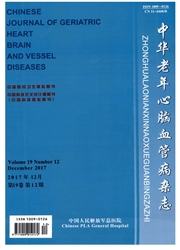

 中文摘要:
中文摘要:
目的 通过调查和分析不稳定型心绞痛患者围术期的焦虑状况,制定相应的心理护理干预方法,预防和减少术后并发症的发生,促进患者康复.方法 选取348例诊断为不稳定型心绞痛并行择期介入治疗的患者,通过焦虑自评量表(self-rating anxietyscale,SAS)测试调查,分为SAS<50分患者与SAS≥50分患者组.两组患者又分别随机分为两个亚组,其中一组进行心理护理干预,另一组进行常规护理,分析心理护理干预对术后并发症发生率的影响.结果 女性较男性SAS积分更高(61.1±10.9 vs 53.1±12.8,P=0.038),更容易存在焦虑障碍;SAS≥50分患者的术后并发症发生率较于SAS<50分患者更高(13.6%vs 25.1%,P=0.033);对于SAS<50分的患者,是否行心理护理干预对术后并发症发生率影响不大(11.1%vs 15.6%,P〉0.05),而对SAS≥50分的患者心理护理干预可显著降低术后并发症的发生率(13.3%vs 37.1%,P<0.01).结论 介入治疗围术期焦虑状态可显著影响不稳定型心绞痛患者介入治疗的预后,对焦虑患者应当加强心理护理,对预防和减少术后并发症的发生是十分有效的.
 英文摘要:
英文摘要:
Objective The corresponding psychological care and intervention method are designed to prevent and reduce postoperative complications to occur and promote patients to get recovered by means of investigating and ana-lyzing the anxiety condition of unstable angina pectoris patients in perioperative period. Methods A total of 348 pa-tients diagnosed as unstable angina pectoris were selected and optional interventional therapy was implemented. By means of self-rating anxiety scale testing investigation, the patients were divided into SAS<50 scores group and SAS≥50 score group. In addition, two groups of patients were divided into two subgroups randomly, of which psychological care intervention was conducted two one group and usual care was conducted to the other group to analyze the influence of psychological care intervention on the occurrence rate of postoperative complications. Results Compared with male, SAS sores of female were higher (61. 1±10. 9 vs 53. 1±12. 8, P=0. 038), and it was easy to have anxiety disorder. With regard to SAS≥50 scores patients, the occurrence rate of postoperative complications was higher than the patients of SAS<50 scores (13. 6% vs 25. 1%, P=0. 033). With regard to the patients of SAS<50 scores, the influence was not large on the occurrence rate of postoperative complications whether psychological care intervention was conducted (11. 1% vs 15. 6%, P>0. 05). However, psychological care intervention conducted to the patients of SAS≥50 scores could significantly reduce the occurrence rate of postoperative complications (13. 3% vs 37. 1%, P<0. 01). Conclu-sion The anxiety state during perioperative period of interventional therapy can significantly influence the prognosis for the unstable angina pectoris patients. Psychological care should be strengthened for the anxiety patients, which is very effective to prevent and reduce the occurrence of postoperative complications.
 同期刊论文项目
同期刊论文项目
 同项目期刊论文
同项目期刊论文
 期刊信息
期刊信息
